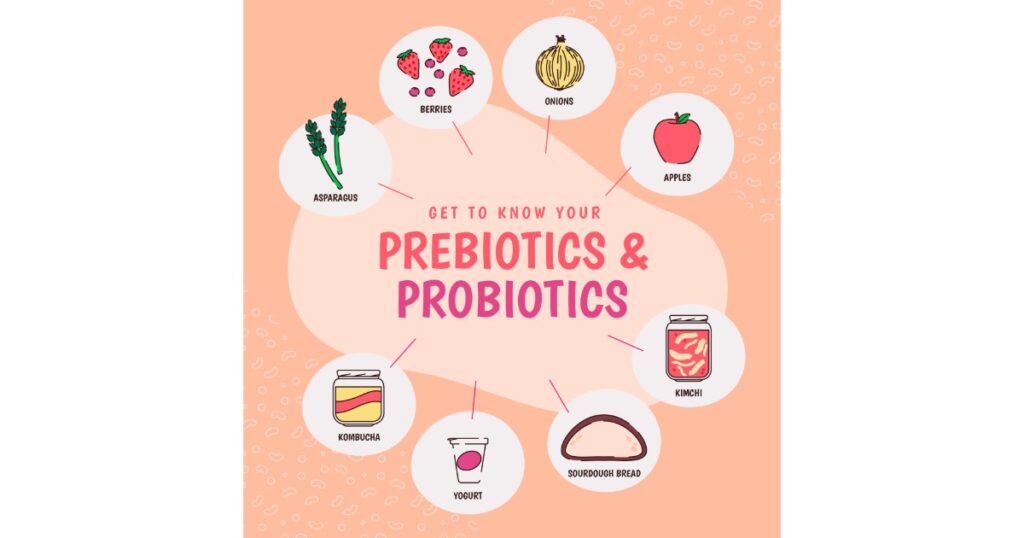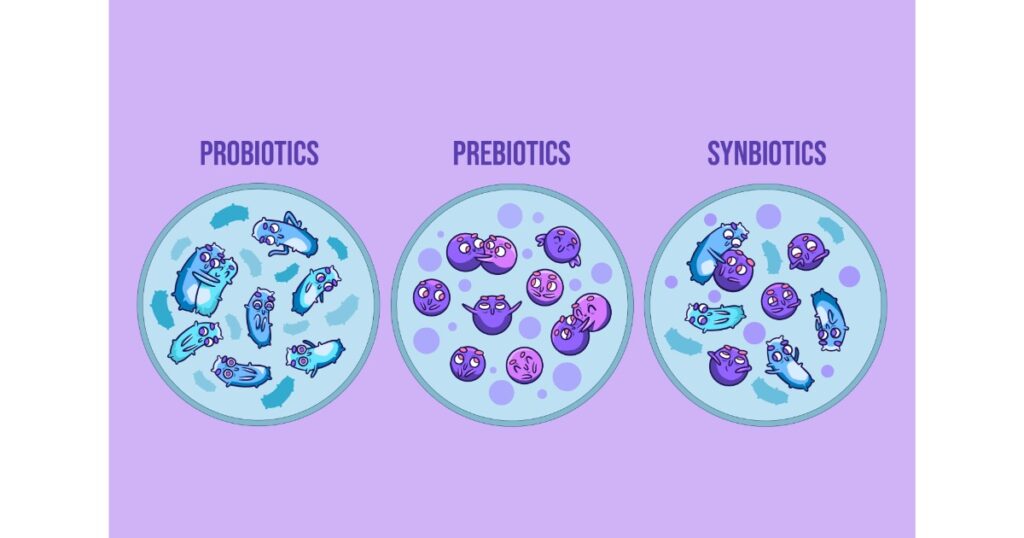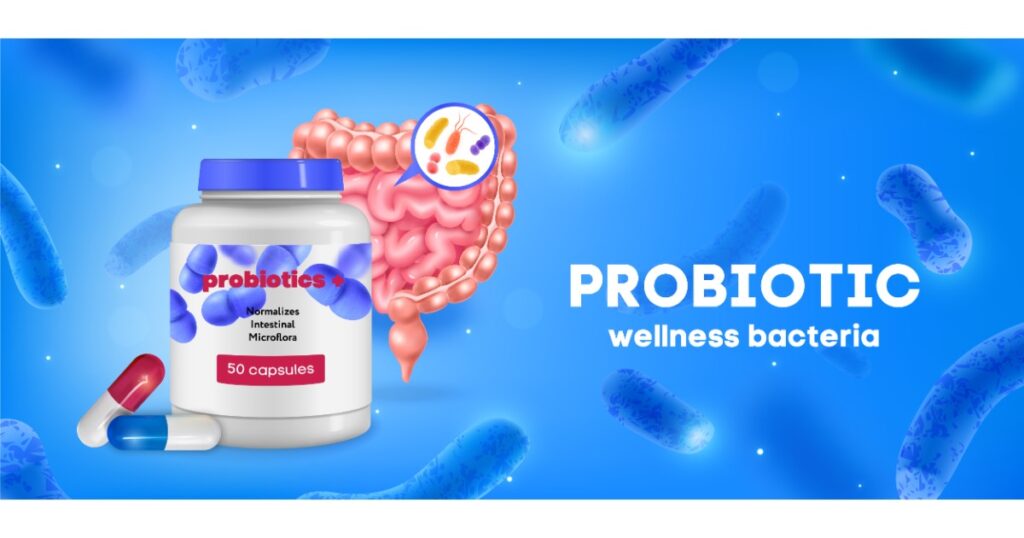Have you ever wondered about the secrets behind a thriving gut and overall vitality?
What if you could unlock a path to better digestion, a stronger immune system, and overall well-being?
In the realm of gut health, two key players take centre stage – Prebiotics and Probiotics. They not only influence your digestion but your entire health landscape.
In addition to pre and probiotic foods, prebiotic and probiotic supplements have also gained popularity in recent years.
Prebiotic and probiotic capsules or tablets are designed to support and enhance the health of your digestive system by promoting the growth and activity of beneficial bacteria.
But do they really help?
Dive into the intriguing world of gut health and discover whether pre and probiotic supplements are as effective as they claim to be.
Uncover the science behind their potential benefits and empower yourself with insights for a healthier you.
Table of Contents
What are Prebiotics?
Prebiotics are nutritional powerhouses crucial for fostering a flourishing gut environment.
These non-digestible fibres, mainly fructans and inulin, serve as food for the trillions of beneficial bacteria that reside in our digestive tracts. Prebiotics fuel the growth and activity of gut-friendly microorganisms, promoting a diverse and robust microbiome.
Garlic, leeks, chicory root, apples, and bananas are a few examples of prebiotic foods.
By incorporating prebiotic-rich foods or supplements into your diet, you don’t just nourish yourself but also pave the way for a thriving and balanced gut ecosystem.
What are Probiotics?
Probiotics are live microorganisms that confer a multitude of health benefits, especially for our digestive wellness.
These friendly bacteria, prominently strains of Lactobacillus and Bifidobacterium, act as guardians of our gut, promoting a harmonious balance by crowding out harmful microbes.
Renowned for their ability to enhance digestion, boost immune function, and even impact mental well-being, probiotics are a go-to solution for those seeking a resilient gut ecosystem.
Difference between Prebiotic and Probiotic

Most people get confused, especially when it comes to distinguishing between prebiotics and probiotics.
Probiotics are live microorganisms, typically strains of bacteria like Lactobacillus and Bifidobacterium, that exert health benefits when consumed in adequate amounts.
These friendly bacteria are found in the digestive tract and help maintain a delicate balance of the microbiome by keeping out harmful bacteria and promoting digestive harmony.
Probiotics are found in fermented foods like yoghurt, kefir, sauerkraut, and kimchi, as well as in supplement form.
On the other hand, prebiotics are non-digestible fibres that serve as a source of nourishment for beneficial bacteria already present in the gut.
Common prebiotics include inulin, fructans, and resistant starch, found in foods like onions, bananas, and whole grains.
They help increase the growth and activity of existing beneficial bacteria.
Combining prebiotics and probiotics can provide a comprehensive approach to our gut, immune, and cognitive health.
Role of Pre and Probiotics in our Gut Health
Let’s understand in detail the criticality of pre and probiotics for our gut health.
Nourish Beneficial Bacteria
Prebiotics serve as a food source for beneficial bacteria in the gut, including Bifidobacteria and Lactobacilli1.
Studies support that prebiotics stimulates the growth and activity of beneficial bacteria, contributing to a more diverse and balanced gut microbiota.
When probiotics feed on prebiotics or ferment them, a lot of by-products are produced. One such product includes short-chain fatty acids – acetate, propionate and butyrate.
It has been found that these fatty acids act as energy sources for the bacteria, which results in increased proliferation.
Support Gut Barrier Function
The formation of short-chain fatty acids also helps enhance the integrity of the gut barrier.2
The intestinal barrier is an important line of defence to maintain the homeostasis of the intestinal microenvironment and protect it from harmful pathogens and toxins.
Prebiotics strengthen the epithelial barrier by encouraging the growth of gut-healthy bacteria and preventing harmful microbes from overpowering.
Modulate Immune Response
Probiotics interact with the immune system, stimulating the activity of immune cells such as macrophages, natural killer cells, and T lymphocytes.
They have also been shown to modulate the immune response by influencing inflammation-causing cytokines and suppressing their action. This indicates that people with joint pain, and arthritis may benefit by taking a pro and prebiotic-rich diet.
Prebiotics influence the activity and distribution of immune cells supporting immune balance and responsiveness.

Balance the Gut Microbiota
Probiotics produce anti-microbial agents or metabolic compounds that lessen the growth of harmful microorganisms.
They help balance gut microbiota by introducing beneficial microorganisms into the digestive system. By taking probiotics, you introduce these beneficial bacteria into the gut, helping to increase the abundance of health-promoting microbes.
Probiotics can compete with harmful or pathogenic microorganisms for resources and space in the gut.
This competitive exclusion helps prevent the overgrowth of potentially harmful bacteria and maintains a balanced microbial environment.
Improve Digestive Health
A healthy gut microbiota, supported by prebiotics, is associated with improved nutrient absorption, including the absorption of minerals and certain vitamins.
Probiotics encourage better digestion by enhancing the production of digestive enzymes, promoting the breakdown of complex carbohydrates and enhancing nutrient absorption.
Some probiotics have been linked to alleviating symptoms of irritable bowel syndrome (IBS) and other digestive disorders.
Enhance Immune Function
Probiotics can modulate immune responses by promoting the production of antibodies and enhancing the activity of immune cells. They play a role in regulating immune function, potentially reducing the risk of infections.
Hence, it won’t be wrong to say that prebiotics and probiotics play complementary roles in promoting gut health by nourishing beneficial bacteria, supporting gut barrier function, modulating immune responses, and improving overall digestive well-being.
Examples of Pre and Probiotic Foods
| Prebiotics | Probiotics |
| Apple | Yoghurt |
| Leeks | Tempeh |
| Garlic | Miso |
| Onion | Kimchi |
| Chicory Root | Kombucha |
| Whole grains like Oats, Quinoa & Barley | Sauerkraut |
| Artichokes | Fermented Pickles |
| Dandelion Greens | Natto |
| Banana | Traditional Buttermilk |
Prebiotic and Probiotic Capsules & Tips To Choose Them

These days you will find many pre and probiotic capsules or supplements in the market.
They may contain only probiotics and some are designed to contain both prebiotics and probiotics (referred to as synbiotics) to provide a comprehensive approach to gut health.
Prebiotic and Probiotic capsules or other supplemental forms are generally safe and well-tolerated, but some individuals may experience digestive discomfort if they consume large amounts.
Here are some guidelines that you make an informed decision.
Form
You can choose between capsules, liquids or tablets based on personal preference and any specific dietary restrictions.
Check the Probiotic Strains
The effectiveness of probiotics in prebiotic and probiotic capsules can vary depending on the specific strains and the individual’s health condition.
Strain specificity matters because different probiotic strains can have different effects, so it is important to choose a product with strains that have been studied for your specific health goals.
For example, Lactobacillus acidophilus probiotic supports overall digestive health, helps maintain a healthy balance of gut bacteria, and may be beneficial for lactose intolerant individuals.
Bifidobacterium bifidum supports the immune system and aids in digestion. L. casei and L. plantarum have been shown to improve the symptoms of Irritable Bowel Syndrome (IBS).
A blend is always better than a single strain.
Colony Forming Units (CFUs)
Check the colony-forming units, which indicate the number of viable bacteria in each dose. Higher CFUs do not necessarily mean better, but a product with at least 10-20 billion CFUs per serving is generally recommended based on some clinical studies.
Always prefer spore-forming probiotics over regular probiotics.
Prebiotic Source
Common prebiotics used in supplements are inulin, fructo-oligosaccharides and galacto-oligosaccharides.
Synbiotics
Prebiotic and probiotic capsules that combine prebiotics and probiotics, called synbiotics are better for a synergistic effect.
Shelf Life
Ensure that the supplement has good shelf stability, meaning the bacteria can survive at room temperature without significant loss of potency.
Quality
Choose products from reputable brands that adhere to quality manufacturing practices.
Check for allergen information, especially if you have known allergies or sensitivities. Some supplements may contain common allergens like dairy, soy, or gluten.
However, it is important to note that individual responses to prebiotics and probiotics can vary, and it may take some time to notice the effects.
Pre and Probiotic Supplements: Side Effects
Prebiotic and probiotic supplements are generally considered safe for most people when taken as directed. However, there are some potential side effects associated with prebiotic and probiotic capsules.
- Some people may experience increased gas production and bloating, especially when first introducing prebiotics.
- Individuals with allergies to certain prebiotic sources or probiotic strains may experience allergic reactions.
- In some cases, prebiotics can cause diarrhoea or constipation.
- People with compromised immune systems or undergoing immunosuppressive therapy may be at a higher risk of developing infections from probiotics.
- Some individuals with Small Intestinal Bacterial Overgrowth (SIBO) may experience worsened symptoms with certain probiotics.
The key is to consult your healthcare professional before starting any new prebiotic and probiotic capsules, especially if you have underlying health conditions or are taking medications.
Summary
To sum up, the world of prebiotic and probiotic capsules offers a promising avenue for enhancing our digestive health and overall well-being. These supplements, whether in the form of capsules, liquids or tablets, have become popular choices for those seeking to optimize their gut microbiome.
Prebiotics, acting as nourishment for beneficial bacteria, pave the way for a flourishing gut environment. From supporting digestive health to bolstering the immune system, probiotic capsules encompass a variety of strains, each with its unique benefits.
While the potential benefits of pre and probiotic capsules are vast, it’s crucial to approach their integration into our routines with mindfulness.
The desire for a healthier, more balanced life is within reach, and prebiotic and probiotic capsules may be the key to achieving it.
Frequently Asked Questions
Can prebiotic and probiotic capsules or supplements help with weight loss?
Some studies suggest that prebiotics may support weight loss by promoting a healthy gut microbiome, but results can vary depending on age, diet, physical activity, medical history, and genetics.
Is there a recommended dosage for prebiotic supplements?
The dosage of prebiotic and probiotic capsules or supplements may vary from brand to brand.
Can probiotics help with skin conditions like acne or eczema?
Some studies suggest a potential link between gut health and skin conditions, and probiotics may offer benefits, but it is advisable to consult your doctor to better understand the strains and dosage.
How long does it take to see the effects of prebiotic and probiotic capsules?
Effects can vary, but some people may notice changes in digestion within a few days to weeks.
Do probiotics survive stomach acid, or do I need an enteric-coated supplement?
Some strains have the property to survive in an acidic medium, but enteric-coated supplements may be more promising.
Are there any considerations for combining pre and probiotic capsules, such as timing or dosage?
It is generally safe to combine them, but individual needs and responses may vary.
Are there any notable differences between prebiotic and probiotic capsules and tablets?
Both are effective, but capsules may be easier to swallow, while tablets may take longer to break down in the digestive system.
Can I get enough pre and probiotics from food alone, or are supplements necessary?
A balanced diet rich in fruits, vegetables, and whole grains provides natural sources. Still, prebiotic and probiotic capsules can be convenient for people for whom consuming a well-balanced diet daily is a challenge.
How long should I take prebiotic and probiotic capsules for optimal results?
Duration depends on individual needs; some people take them consistently, while others use them periodically for specific goals.
Are there specific pre and prebiotics that are more effective for certain health conditions?
Different strains and sources may offer unique benefits, therefore consulting a healthcare professional before taking prebiotic and probiotic capsules for personalized recommendations is advisable.
Sources
- Slavin, J. L. (2013). Fiber and Prebiotics: Mechanisms and health benefits. Nutrients, 5(4), 1417–1435. https://doi.org/10.3390/nu5041417 ↩︎
- Camilleri, M. (2021). Human intestinal barrier: effects of stressors, diet, prebiotics, and probiotics. Clinical and Translational Gastroenterology, 12(1), e00308. https://doi.org/10.14309/ctg.0000000000000308 ↩︎
